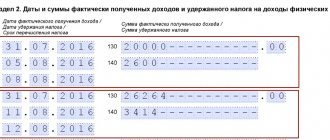When maintaining records in programs 1C 8.3 and 8.2 from 2021, it is important to monitor the correspondence between the actual date of receipt of income, which is taken into account in the income register (in ZUP 3.0, Accounting 3.0 this is the accumulation register Income Accounting for calculating personal income tax , in ZUP 2.5 - the personal income tax Information on income ) and the one that is registered in the tax accounting register (in ZUP 3.0 and Accounting 3.0 this is the accumulation register Taxpayers’ calculations with the budget for personal income tax , in ZUP 2.5 – personal income tax Calculations with the budget ). If there is a desynchronization between them, then errors will occur in the 1C program when calculating tax.
Important! To avoid possible errors in personal income tax, keep track of the correspondence in the 1C 8.3 (8.2) program between the date of income in the income register and the date of income in the tax register , otherwise the program will have errors when calculating tax.
When registering any income in the program, the date of actual receipt of income is recorded. For income with code 2000, this is the last day of the accrual month. For other income, this is the planned payment date from the corresponding accrual document. When a tax is calculated, the program analyzes what kind of income this tax is calculated on, and determines the date of actual receipt of income, which is recorded in the tax register.
Why can there be a difference in the date of receipt of income, which is taken into account in the income register and the personal income tax register? Let's look at it below.
Possible errors when calculating personal income tax in the 1C 8.2 ZUP 2.5 program
Let's look at ZUP 2.5 in the 1C program using the example of the “Vacation” document. Vacation pay was accrued, which was initially planned to be paid on 01/29/2016. In fact, payment is made on 01/28/2016. Therefore, we change the date of payment of income in the vacation accrual document to 01/28/2016. This date falls into the income register.
The tax accounting register 1C 8.2 includes the date from the personal income tax tabular section, which we see on the “Payment” tab of the document “Accrual of vacation for employees of organizations.” The date here has not changed, but remains 01/29/2016.
In order for this date to also change, we need to either recalculate the document completely or recalculate only the personal income tax. If recalculation is undesirable or impossible for some reason, the date can be adjusted manually.
Let's simulate a situation where we have a discrepancy in the dates of receipt of income and post the document. Now we will show what mistakes this is fraught with in the future.
We look at the registers to see if there is a discrepancy. Our income register includes the date 01/28/2016.
It was entered into the tax register on 01/29/2016.
Then we pay vacation pay. We submit the document for payment. We look at its movement through the tax accounting register, which records the actual tax withheld. The date of receipt of income is recorded here as 01/29/2016 from the tax register.
In form 6-NDFL, this situation will look like this: the date of actual receipt of income (line 100) is 01/29/2016, and the date of tax withholding (line 110) is 01/28/2016. It turned out that we withheld the tax earlier than accrued income, whereas for income in the form of vacation payments, these two dates (the date of receipt of income and the date of tax withholding) must coincide.
But that's not all! When calculating salaries, the 1C program tries to correct personal income tax and bring it into compliance. Therefore, it reverses the tax from the date of receipt of income on January 29, 2016 and charges the same amount as of January 28, 2016.
Further, when paying wages, the withheld tax is recorded in exactly the same way. One line in the personal income tax with a “minus” from 01/29/2016, and the second line with a “plus” from 01/28/2016.
In 6-NDFL, two more groups of lines are added from 100 to 140. In one, everything is reversed, and in the other, everything is accrued anew.
To prevent this situation from arising, carefully monitor the date of receipt of income, which will be recorded in the Income Register, and the date of receipt of income, which will be recorded in the Tax Register. They must match.
How to return excessively withheld personal income tax - procedure
To refund the over-withheld amount of personal income tax, you must adhere to the following scheme:
- Detection of the fact of excessive withholding of personal income tax due to an error in the calculations.
- Checking for the presence of a special case in which the personal income tax refund is carried out only by the Federal Tax Service, not by a tax agent.
- Notifying the employee about the error and the need to write a statement (within 10 working days).
- Receiving an application for the return of an excessively withheld amount of personal income tax to an employee.
- If the company has personal income tax payable to the budget, withdraw the withheld tax amount from the next payment to the budget and transfer it to the employee’s bank account (do not give it in cash).
- If there is no tax payable to the budget, you should contact the Federal Tax Service with a request for a refund from the budget.
- Receiving funds from the Federal Tax Service to the account of the tax agent.
- Transfer of funds to an employee.
Possible errors when calculating personal income tax in the 1C 8.3 ZUP 3.0 program.
In the 1C ZUP 3.0 program, the date of receipt of income is also taken into account in two registers: the Income Accounting Register and the Tax Accounting Register. For example, consider the document “Vacation”. The Income Accounting Register contains the date of payment from the main form of the document.
And in the Tax Registration Register - the date from the form “More details about the calculation of personal income tax”.
These two dates must match. But if we change the date in the main form of the document, the date automatically changes in the “More details about personal income tax calculation” form. It’s easier here, the ZUP 3.0 program. she guarantees us that these dates will coincide.
The only thing is that in the current release of the 1C program there is an error for the “Sick Leave” document. If it is paid with a salary, and we change the date of payment, then in this case the date of receipt of income in the form “More details about calculating personal income tax” does not itself change.
Here you need to recalculate, or change the date in the “More details about personal income tax calculation” form manually.
For all other cases, the personal income tax accounting date should change automatically upon the payment date. But just in case, check this moment, make sure the dates match.
Common mistakes
Error:
An employer who erroneously withheld an excessive amount of personal income tax from the income of employees, upon their request, returned the tax amount in cash.
A comment:
Excessively withheld personal income tax is always returned exclusively through a non-cash transfer of funds. This also applies to cases where the salary or other income, from the amount of which excess tax was withheld, was paid to the employee in cash at the cash desk of the enterprise.
Error:
The employee was transferred within the group from one company to another company, and the former employer's company was subsequently liquidated. Does a liquidated company need to provide an employee with a personal income tax refund?
A comment:
No, in such situations, tax refunds can only be handled by the tax office.
Possible errors when calculating personal income tax in the 1C 8.3 Accounting 3.0 program
As for the 1C Accounting 3.0 program, there are also two inter-account documents “Sick Leave” and “Vacation”. There is also a payment date here, and if this date changes, everything changes automatically. The date of receipt of income for personal income tax also changes automatically. But, just in case, check.
Possible errors when calculating personal income tax
Also, when calculating personal income tax, we must pay attention to the tax accrual date. This is relevant for programs of the third version. The tax accrual date must be strictly before the tax withholding date. If at the time of withholding the tax, the tax itself has not been accrued, then, in fact, there is nothing to withhold.
Important! Track in the 1C program: the dates of intersettlement documents are the date of tax accrual; if at the time of payment the tax is not accrued, it will not be withheld.
This is especially true for non-salary income, since the date of the document is fixed as the tax accrual date. Thus, in the third version, the date of the “Vacation” document, the date of the “Sick Leave” document and other documents are also important.
When an overpayment cannot be offset
Overpayment of personal income tax on dividends. The company paid dividends to the employee. Due to a technical glitch in the program, instead of a rate of 9% (clause 4 of Article 224 of the Tax Code of the Russian Federation), the accountant applied a rate of 15% (clause 3 of Article 224 of the Tax Code of the Russian Federation).
As a result, there was an overpayment of personal income tax. It cannot be counted against personal income tax payments from wages, but can only be returned. This is explained as follows.
The amount of personal income tax on wages is determined separately from the amount of personal income tax on dividends. This follows from paragraph 1 of Article 225 of the Tax Code.
When calculating personal income tax on dividends and personal income tax on wages, different tax rates are used (9% and 13%), two different tax bases are calculated (clause 2 of article 210 of the Tax Code of the Russian Federation).
The calendar year has ended. The total amount of tax is calculated based on the results of the calendar year (clause 3 of Article 225 of the Tax Code of the Russian Federation).
If at the end of the year there is an overpayment, the accountant cannot offset it against future personal income tax withholdings from the income of the next calendar year.
For example, personal income tax was excessively withheld from an employee’s salary for 2013. This overpayment cannot be taken into account when calculating tax on income accrued in 2014. Since in 2014 the accountant determines the tax base starting from January 1 (clause 3 of Article 226 of the Tax Code of the Russian Federation).
The employee quit. Since after dismissal the employee will no longer receive income from this organization, offset becomes impossible.
When it cannot be counted, it can be returned. In all cases in which the overly withheld personal income tax cannot be offset, it can be returned. A refund can be made:
- a company in which an excessively withheld amount of personal income tax was formed. The return procedure is described below;
- tax office. To do this, after the end of the calendar year, the employee can submit a declaration in Form 3-NDFL. It must be accompanied by a certificate in form 2-NDFL (clause 5.6 of the certificate will reflect the excess amount of personal income tax withheld) and a tax refund application.
Note. You can submit an application for a personal income tax refund within three years after the end of the year in which the tax was excessively withheld (clause 7 of article 78 of the Tax Code of the Russian Federation).
Possible errors in interpayment documents using the example of 1C 8.3 ZUP 3.0
Using the example of the 1C ZUP 3.0 program in the “Vacation” document, the planned payment date is 01/28/2016, but we will set the document date to 01/30/2016, that is, later than the planned payment date. Let's see it through.
Our Tax Registration Register entry was created as of January 30, 2016.
If we pay vacation pay earlier than the document date - January 28, 2016, as planned, we fill out the statement, we see that the withheld personal income tax is not filled out. As of January 28, 2016, there is no calculated tax. Accordingly, when conducting such a statement, personal income tax withheld is not registered.
If everything is fine with the document date and it is earlier than the planned payment date:
Then when you fill out the form, everything will be fine, the tax will be determined. When conducting the Statement, it is recorded as withheld tax.
How to return excessively withheld personal income tax - special cases
There are situations when an employee’s tax agent does not have the right to refund funds to the employee against over-withheld personal income tax. Then the employee has to apply for a refund to the Federal Tax Service of the Russian Federation:
- If the refund is not related to the erroneous withholding of an excess amount of personal income tax, but to a change in the employee’s status from non-resident to resident, only the Federal Tax Service has the right to recalculate personal income tax and return funds to the employee. The employee may not be informed about such tax overpayments (clause 1.1 of Article 231 of the Tax Code of the Russian Federation).
- If an employee is transferred within a group from company to company with the subsequent liquidation of one of these companies, the return of personal income tax is carried out not by the liquidated enterprise, but by the Federal Tax Service.
Possible errors in interpayment documents using the example of 1C Accounting 3.0
In the 1C Accounting 3.0 program everything is the same. The date of the document is important. Let's look at the example of the “Vacation” document. The planned payment date is 01/28/2016, and we will deliberately set the date of the document later, for example, 01/30/2016. We will post the document.
The calculated tax was registered as of 01/30/2016.
After the payment is made, and not in the Statement, namely the “Cash Withdrawal” payment or debiting from the current account earlier than the date of the “Vacation” document, the withheld tax is not registered, is not determined and is not recorded in the Register.
Therefore, the date of the document is important; if we set it to 01/28/2016 and reschedule the cash issuance, then a record for the withheld personal income tax has been created, everything has been included in the Register and will then be included in form 6-NDFL.
Be careful ! In the 1C Accounting 3.0 program, this is especially important, because the personal income tax withheld is not displayed in the Sheet, that is, we do not observe or see errors in the on-screen form itself. But if you look at the Register, you can track such a moment. Therefore, in the 1C Accounting 3.0 program, when paying salaries, look and check how the personal income tax withheld was recorded, see the movement in the Register “Calculations of taxpayers with the budget for personal income tax.”
Answers to common questions about how to return overly withheld personal income tax
Question #1:
Does the Tax Code allow an employee to return excessively withheld personal income tax from the tax agent’s own funds with subsequent compensation from the budget?
Answer:
If an enterprise does not have personal income tax to pay to the budget, funds can be requested from the budget by sending a corresponding application to the Federal Tax Service. In this case, despite the fact that the employer would have met the three-month deadline for returning the overly withheld tax to the employee, he is allowed to give him money from his own funds, without waiting for the transfer of personal income tax from the budget, and then receive compensation from the budget.
Question #2:
Is it necessary to notify an employee that he needs to recalculate personal income tax in connection with a change in status from non-resident to resident?
Answer:
No, you do not need to report the need to recalculate the tax; this will be handled by the tax office.
Possible errors in interpayment documents using the example of 1C 8.2 ZUP 2.5
As for the 1C ZUP 2.5 program, in the current release the date of the document, for example, “Vacation”, does not in any way affect the calculation of withheld personal income tax. For example, let’s take a vacation accrual with a planned payment date of 01/28/2016 and change the document date to 01/30/2016. After that, we will repost the Salary Payment Sheet. Let's see the movement according to the Registers.
The program 1C ZUP 2.5 personal income tax withheld saw and registered it. Therefore, document dates are not so important here.
But such a mechanism, when the program tries to withhold everything accrued as of the end of the month, which is used in the 1C 8.2 ZUP 2.5 program, has its drawbacks and leads to other problems, which we will consider in the next question, when we talk about personal income tax withheld.
Give your rating to this article: (
3 ratings, average: 4.67 out of 5)
Registered users have access to more than 300 video lessons on working in 1C: Accounting 8, 1C: ZUP
Registered users have access to more than 300 video lessons on working in 1C: Accounting 8, 1C: ZUP
I am already registered
After registering, you will receive a link to the specified address to watch more than 300 video lessons on working in 1C: Accounting 8, 1C: ZUP 8 (free)
By submitting this form, you agree to the Privacy Policy and consent to the processing of personal data
Login to your account
Forgot your password?
What does the legislator say?
The procedure for returning personal income tax withheld excessively from income is contained in the Tax Code of the Russian Federation, Art. 231-1. The return of amounts to the employer that he excessively transferred for the employee to the Federal Tax Service is regulated by the Tax Code of the Russian Federation, Art. 78. Article 231 does not exclude the possibility of paying a citizen personal income tax amounts from the employer’s funds until the moment when the Federal Tax Service Inspectorate returns this money to the employer’s account.
The same article talks about the need for a tax refund if the payer wrote an application addressed to the employer with a request to provide him with a property deduction, but the right to deduction was not taken into account in the calculation.
Property deduction in connection with the purchase (construction) of housing has its own nuances when it comes to income tax refunds.
According to the law, an individual has the opportunity to receive a deduction (according to the Tax Code of the Russian Federation, Article 220, paragraphs 7-8):
- at the tax office at the end of the year;
- in the place where he works, in the middle of the year.
When applying for a deduction at the place of work, the taxpayer must keep in mind that the accounting department will begin to reduce personal income tax in calculations from the month in which he wrote an application requesting a deduction. This raises the question of whether the employer should recalculate the tax downward from the beginning of the year and then return it.
The Ministry of Finance says that the employer should not return personal income tax withheld before receiving the taxpayer’s application (with confirmation from the tax office that he has the right to do so) (document No. 03-04-06/6-46 dated 21/03/11 . and a number of others).





